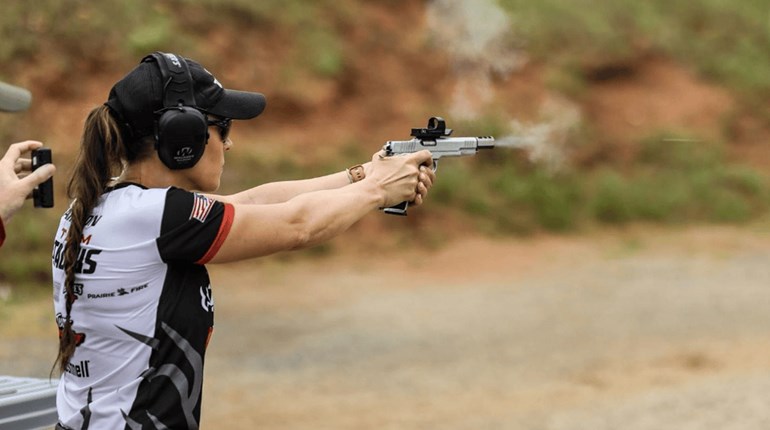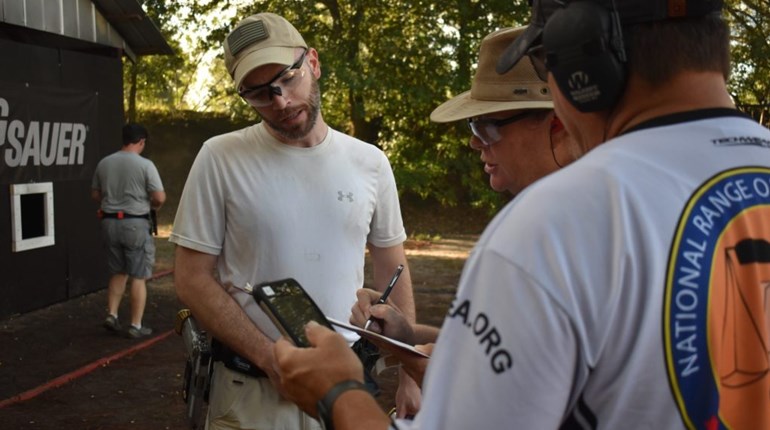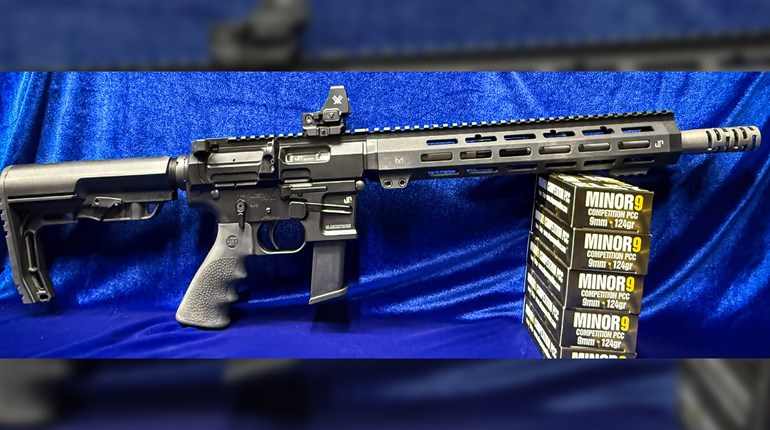
We wouldn’t blame any Carry Lifer who thinks we’re adrift in the wrong alphabet soup as we report on the United States Practical Shooting Association’s (USPSA) “all-optics” National Championships. A reasonable objector might say, “Er, don’t the defensive/protective aspects of handgunning have their own outfit?” Our reply would be affirmative—at least if you’re thinking of the International Defensive Pistol Association (IDPA)—and it’s a fine one, too. But with the addition of electronically sighted pistol caliber carbines (here, here, here and here) to what has been an all-handgun party at the Nationals level, USPSA has very effectively invited a lot of new shooters to an already-grand occasion. We heartily approve.
USPSA President Mike Foley put it in perspective with singular clarity when we asked him about this first all-optics Nationals. “Historically, USPSA has been a proving ground for firearms technology,” he said. “We pushed the limits in terms of firearms and optics available to the ragged edge, only to fall back to the last reliable combinations. Many of the red dot optics in use by military, law enforcement, and enthusiasts today owe their origins to designs and tests that were a part of the evolution of our game. If you are using a red dot optic today, it is better because of what USPSA competitors learned years ago. We moved away from slide-mounted optics, in favor of optics mounted to non-reciprocating mounts attached to the frame.” USPSA has very effectively invited a lot of new shooters to an already-grand occasion. We heartily approve.
It’s interesting to note that Carry Optic pistols have brought slide mounting back into vogue in a big way—small, modern, ultra-tough red-dots have Open division forebears to thank.
“We have also pushed the limits on reliable magazine capacity. Once a competition-only trend, extended magazine base pads are now common in the mainstream market,” Foley said. “While USPSA’s Open Division evolved, our Production division was where our most reliable (and affordable) guns lived. The combination of the two seemed a natural one to us—though not entirely without some resistance. A lot of commonly available firearms already have integral optics mounting capability for the addition of red-dot or reflex sights, and have filtered into LE, military and civilian use.”
And pistol caliber carbine? “Pistol caliber carbines and red dot sights have now surpassed a 40-year evolution,” Foley said. “They are quieter than rifles, limited in penetration, and inexpensive to feed. These are attributes that sport shooters find attractive, too.
“There are lots of places where a centerfire rifle is too much of everything—too hard on targets, too much velocity and range, and too much noise. Pistol Caliber Carbines solve all these problems to a huge extent, plus they’re lots a fun, and a great way to get new shooters to join competition by taking some of the ‘edge’ off. Best of all, USPSA competitors have found another way to do what we most like to do—shoot, and get others to shoot. The more people we can get to shoot pistols and carbines, the stronger the support for the Second Amendment becomes. It is no accident that the practical shooting experiment is ever evolving, and testing the validity of a wider variety of firearms and optics than ever before.”
The “more people shooting” part we can certainly vouch for. By the time you read this, some 340 competitors will be running those electronically-sighted Open (186), Carry Optics (71) and PCC (83) guns right to the edge of their capabilities. Twenty stages replete with varying combinations of paper, steel (must fall to score) and moving targets will demand between eight and 32 rounds, and at distances out to 35 yards. It is no accident that the practical shooting experiment is ever evolving, and testing the validity of a wider variety of firearms and optics than ever before.
If that sounds easy, consider: Top competitors will generate 2 “A” hits per second (and sometimes well more), and slowpokes (we won’t mention any names) still half that. The rapid precision occurs while navigating physical and vision barriers, spring loaded platforms, weak-handed shots and the like, all while avoiding the dreaded “no-shoot”—a good guy upon whom any hits are penalized at least double.
Frequent A1F Daily contributor Julie Golob, the Carry Optics Ladies National champion from 2016—and the only USPSA seven division women’s winner to date—is the odds-on favorite to repeat this year. With Carry Optics’ “provisional” status a thing of the past, the Smith & Wesson shooting team captain told us: “This particular nationals is very exciting. You have highly customized race guns (Open), a sport where pistol caliber carbines can play and of course Carry Optics, the division I am shooting. This division is really the best of both worlds in many ways—an affordable gun you purchase at a local gun shop with a red dot optic that gives you a burst of speed. It’s like adding a bit of Nitro to a trusty Ford.”
Her point is a good one. And perhaps it’s no surprise that it’s also where we get back to the Carry Life. One end of the spectrum is Open division, reminding us that pure—and often, utterly astonishing—speed has its virtues, especially in terms of pushing out the boundaries. Pistol Caliber Carbines are still working into a niche on the other end with challenges and improvements emerging at a rapid pace. While we think folks are a long way from widely suggesting them for everyday carry, it’s hard to imagine a better way to bring outsiders into shooting, or to shoot for the pure fun of it.
Smack in the middle, however, are gems for the Carry Lifer: Reliable, affordable defensive dot-sighted pistols, and few proofs of their maturity are better than the unified USPSA Optics Nationals. Try one soon, even if a trip to Nationals isn’t in your plans.
Now Carry on.
Frank Winn has been studying arms and their relationship to tyranny, meaningful liberty and personal security all his adult life. He has also been a competitive shooter and firearms safety/shooting instructor for more than 20 years, though he won’t admit how many more.
































